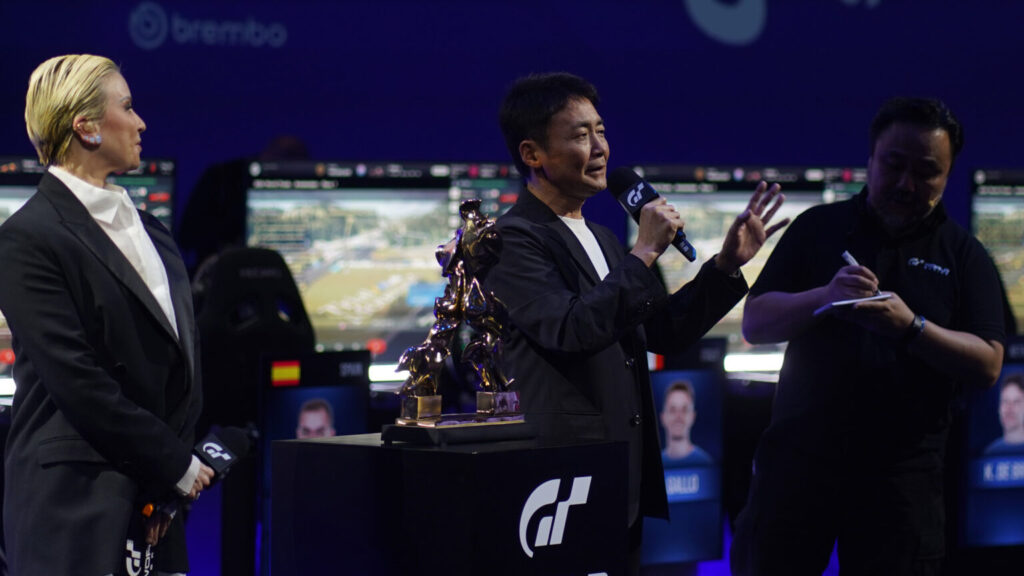Kazunori Yamauchi, the legendary creator of Gran Turismo and president of Polyphony Digital, has been a central figure in the evolution of sim racing for nearly three decades. As PlayStation celebrates its 30th anniversary, Yamauchi reflects on how Gran Turismo has grown alongside the platform and his philosophy that racing simulators should be accessible to everyone. Known for his meticulous attention to detail and passion for motorsports, Yamauchi’s vision for Gran Turismo has not only shaped the racing game genre but also influenced the real-world automotive industry.
The Beginnings: Gran Turismo and PlayStation’s Partnership
When the original PlayStation launched in 1994, it revolutionized gaming with its ability to deliver high-quality 3D graphics and immersive gameplay. For Yamauchi, this was the perfect platform to bring his vision of a realistic racing simulator to life. In 1997, Gran Turismo debuted, showcasing a level of realism and depth that had never been seen before in racing games.
Yamauchi recalls, “At the time, PlayStation was breaking boundaries, and Gran Turismo became an extension of that philosophy. The hardware allowed us to create a game that felt more like real driving than anything before it. It was a perfect match.”
The relationship between Gran Turismo and PlayStation has remained strong, with each new console generation bringing advancements in graphics, physics, and gameplay. From the PlayStation 2’s Gran Turismo 3: A-Spec to the PS5’s Gran Turismo 7, the series has consistently pushed the boundaries of what is possible in racing games.
Sim Racing: A Philosophy of Accessibility
While Gran Turismo is often praised for its realism, Yamauchi has always prioritized making the game enjoyable for a wide audience. He believes that the essence of driving can be captured without overwhelming players with complexity.
“Sim racing doesn’t have to be difficult to be authentic,” he says. “The challenge should come from mastering the track and improving your skills, not from struggling with the controls or unrealistic mechanics.”
To achieve this balance, Polyphony Digital has developed innovative features like driving assists and dynamic difficulty settings. These tools ensure that beginners can enjoy the game while seasoned players still find it challenging. Yamauchi emphasizes that Gran Turismo is a celebration of driving, and everyone should have the opportunity to experience that joy.
Innovation and Realism in Gran Turismo
Yamauchi’s obsession with realism is legendary. Every car in Gran Turismo is meticulously modeled, from its exterior design to its engine performance. Tracks are recreated with such precision that professional drivers often use the game for practice.
However, Yamauchi sees realism as more than just accurate graphics and physics. “Realism is also about capturing the emotional experience of driving,” he explains. “It’s the sound of the engine, the way the car reacts to your inputs, and the connection you feel with the road.”
In Gran Turismo 7, this philosophy is evident in features like adaptive triggers that mimic the feel of braking and acceleration, ray-traced graphics that enhance the visual fidelity, and 3D audio that immerses players in the soundscape of the race.
Gran Turismo’s Impression on the Automotive World
The influence of Gran Turismo extends beyond gaming. Over the years, the series has introduced millions of players to car culture and motorsports, often sparking lifelong passions for driving. Many automotive manufacturers have partnered with Polyphony Digital to showcase their vehicles in the game, and some even design exclusive concept cars for Gran Turismo.
Yamauchi notes, “When we started, I never imagined that car companies would create vehicles specifically for our game. It’s a testament to how much Gran Turismo has become a part of the automotive world.”
The Gran Turismo Vision project, which invites manufacturers to design futuristic vehicles for the game, is a prime example of this collaboration. Brands like Mercedes-Benz, Ferrari, and Porsche have used the platform to explore bold ideas and connect with a younger, tech-savvy audience.
30 Years of PlayStation: A Shared Legacy
Reflecting on PlayStation’s 30th anniversary, Yamauchi acknowledges the mutual growth between the platform and Gran Turismo. “PlayStation’s evolution has allowed us to realize our vision in ways that wouldn’t have been possible otherwise,” he says. “Each console generation has brought new opportunities to innovate and push the limits of what Gran Turismo can be.”
The series has also played a role in defining the PlayStation brand. From being a launch title for the PS2 and PS3 to showcasing the PS5’s capabilities, Gran Turismo has been a cornerstone of PlayStation’s success.
Gran Turismo and the Future of Sim Racing
Looking ahead, Yamauchi is optimistic about the future of Gran Turismo and sim racing as a whole. Advances in technology, such as virtual reality and AI, are opening up new possibilities for the genre. In fact, Gran Turismo 7’s VR mode on the PlayStation VR2 has been widely praised for its immersive experience.
Yamauchi is particularly excited about the potential for AI to enhance the game. Polyphony Digital’s Gran Turismo Sophy, an AI racing agent, has demonstrated the ability to compete at a professional level while also adapting to different play styles. “AI isn’t just about creating a challenging opponent,” Yamauchi says. “It’s about enriching the player’s experience and making the game more dynamic.”
Why Sim Racing Shouldn’t Be Difficult
Yamauchi’s belief in accessibility stems from his own love of driving. He wants players to feel the same exhilaration he experiences behind the wheel, regardless of their skill level. This philosophy challenges the notion that sim racing must be difficult to be rewarding.
By lowering the barriers to entry, Gran Turismo has introduced millions of people to the joy of racing. Features like guided tutorials, customizable assists, and an intuitive interface ensure that even beginners can enjoy the game without feeling intimidated.
Gran Turismo’s Cultural Legacy
As Gran Turismo celebrates over 25 years of success, its cultural impact is undeniable. The series has inspired countless players to pursue careers in motorsports, with some even transitioning from virtual racing to real-world competition through programs like the GT Academy.
Yamauchi sees this as one of the series’ greatest achievements. “To know that Gran Turismo has changed people’s lives is incredibly rewarding,” he says. “It’s more than a game; it’s a gateway to a world of possibilities.”
Impression
Kazunori Yamauchi’s vision for Gran Turismo has always been about more than just racing—it’s about celebrating the art and culture of driving. As PlayStation marks its 30th anniversary, Yamauchi’s reflections highlight the symbiotic relationship between the platform and the game that has become its flagship racing title.
With its commitment to accessibility, realism, and innovation, Gran Turismo continues to set the standard for sim racing. As Yamauchi and Polyphony Digital look to the future, one thing is clear: the Gran Turismo legacy is far from finished. Whether you’re a casual gamer or a hardcore enthusiast, the series offers an unparalleled experience that captures the essence of the open road.
No comments yet.








